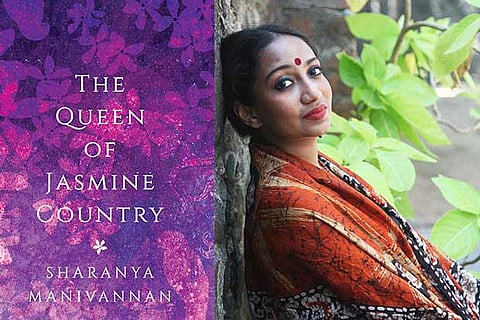

Chennai
In her debut novel, The Queen of Jasmine Country, Sharanya Manivannan imagines the life of the devotional poet Andal, whose sublime and erotic verses remain beloved and controversial to this day. Andal is the only female Alvar among the 12 Alvar saints of south India who is credited with great Tamil works, Thiruppavai and Nachiar Tirumozhi. We caught up with the city-based author to know more about the book and the inspiration behind dedicating a book to Andal.
“Centuries before she was accorded goddess status, Andal was a teenage girl from Tamil Nadu, who expressed all her sorrows and desires through poetry. Unusually for her time, she was both unmarried and literate, yet bounded by the norms of society. What could it have been like to have been her? In 2014, I had two dreams of Andal. In one, I dreamt that I had gone to a temple of hers to make a kalyanavenduthal (a petition to get married) and when I arrived before her sanctum, she looked at me, rolled her eyes at the rest of the crowd, and said with great camaraderie and derision, “If these are the options, no…” It was a feminist romantic advice! The other dream is less detailed — all I carried of it back to waking is that she told me to write a novel about her. I am always working on multiple projects at once, so I put it on my list and left it there to simmer away,” she says.
The book is a story about a talented lonely young woman who lived over a thousand years ago, who found solace in poetry and prayer. She was 16 years old and had been adopted into a slightly unusual family, and unlike all her peers was not married off in childhood. Because her father was a poet, he taught her how to read and write — and this too sets her apart. She then decides to undertake secret rites, deepening and honing her entreaty. Andal’s original name was Kodhai. “She wrote about her experiences and she had no idea that one day she would be known as Andal, an epithet which means ‘she who rules.’”
There is virtually no material on the historical figure of Andal and what we have is religious hagiography. Instead of doing a biographical research, Sharanya read around her. “For the structure of my book, I followed the poetry closely. Queen is about the months during which Kodhai wrote the Tiruppavai and the Nachiyar Tirumozhi, the events in her life that inspired those verses.”
Though Andal’s verses resonate in temples and houses across Tamil Nadu, Sharanya observes that those who worship Andal do so without engaging with her words. “When poet Vairamuthu was attacked last year for his suggestion that Andal could have lived out her days as a devadasi in the Srirangam temple, a woman in her 90s I know who had memorised the entire Divya Prabhandam as a girl was not offended. But I also know another woman in her 20s who, having neither read the Nachiyar Tirumozhi nor having known who the devadasis were, was prepared to go to Chepauk stadium to protest. These two examples illustrate the divide between those who care and those who prefer to hide behind symbols,” she remarks.
Visit news.dtnext.in to explore our interactive epaper!
Download the DT Next app for more exciting features!
Click here for iOS
Click here for Android